TR Interview: Oculus Director Mike Flanagan
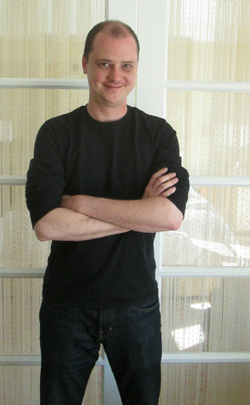 |
Have you ever been afraid of mirrors? You will be once Mike Flanagan is done with you.
A fanboy himself, he cast two of his, and our, favorite sci-fi actresses – Karen Gillan and Katee Sackhoff – knowing you’ll come to see them. Then once you’re there, he is gonna mess with your head.
We discussed dream casting, the challenge of making a mirror monster, and the obvious virtual headset jokes, among many other things.
Luke Y. Thompson: I’ve got to give you credit – when I was a kid, I saw a movie called The Watcher in the Woods.
Mike Flanagan: Yeah, yeah!
LYT: I was semi-scared of mirrors for years afterwards.
MF: That movie – people don’t remember that movie. And it’s such a shame that they don’t make the PG horror any more – because that was Disney that put that out!
LYT: Yeah.
MF: So they don’t make those anymore, the kid-accessible horror, because that was terrifying – the blindfold…
LYT: Yeah, I think you’ve undone all of the progress that I’ve made.
MF: I apologize.
LYT: No, that’s a testament to its effectiveness. Did you ever have that fear of mirrors? Did that movie stimulate something in you?
MF: Yeah. That movie certainly scared me. There was another one, a very old movie called Dead of Night, that had elements of that too. Mirrors freaked me out as a kid, playing the Bloody Mary games and all that stuff. And as I got older, that realization that the image that I have in my own brain of myself is actually wrong, it’s totally backwards, because I believe the mirror every day. That and coming across the tradition in the Jewish faith, where they’ll cover the mirror at a funeral, because this will keep the dead from coming back. I was like, that’s terrifying! Oh my god! So yeah, that all kind of came together for this, and that kind of campfire ghost story vibe that I grew up with that I just loved, of being told why something is scary before you have to get into it. I think that’s really fun. But yeah – mirrors do creep me out, especially now.
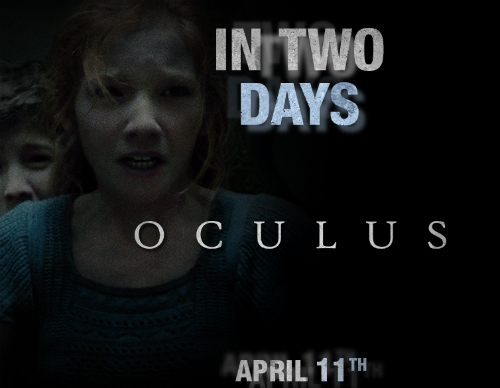 |
LYT: I also love that the set-up for it is the classic found footage set-up, but it’s not a found footage movie.
MF: Yeah, that was a tough battle, actually, because everybody saw cameras in the room on the short, and was like, “This is great! We’d be happy to do this movie. Let’s go found footage.” I was like, “No! Not in this one!” Because I have nothing against that sub-genre, but found footage movie, what’s in the frame is objective. It has to be, and since the whole point was to kind of mess with perception and reality, I was like, I can’t do that with found footage, because you can’t question what you see.
LYT: Which funnily enough is the exact point of Blair Witch 2, but they didn’t pull it off, and you did.
MF: And it’s funny, because I’m an apologist for Blair Witch 2. It wasn’t the movie anybody expected. It certainly wasn’t retreading the first one, and it had some ambitious ideas. I agree, I don’t think they pulled it off, but I thought there were some neat qualities to it.
LYT: I agree. It didn’t succeed, but I appreciated what they were trying to do. I think you’ve pulled it off a little better than they did. But I understand that you had that kind of in mind as an inspiration as well.
MF: I saw that opening night when it came out, and it was not at all what I expected. But one of the things that I loved about it was when they went back and watched the footage at the end, and it didn’t match up to what I assumed was an objective experience, and that definitely stuck with me as effective.
LYT: The movie specifically has that line: “Film lies; video tells the truth.”
MF: Yeah.
LYT: So how many Oculus Rift jokes have you heard today?
MF: None today! I was braced for it, because that landed HUGE on us, and the backlash of it. I was like, oh god! Are we going to get kind of pulled into this intense dissatisfaction that the internet has over Oculus Rift? At the end of the day, at least people recognize our title, just hopefully not in a negative context. I had one person e-mail me and say “Did someone buy your movie for $2 billion?” I promise you, they didn’t. I promise.
LYT: What was your reaction when you heard WWE bought it?
MF: They came on – they didn’t so much buy it. They came on – first Relativity, they actually purchased the film. Blumhouse then came on then to assist with marketing. WWE was the last one, and they showed up, and they said “We saw the film in Toronto. We loved the film, and we want to help market, because we have this huge audience.” There’s a lot of crossover between WWE’s core audience and horror fans.
Initially, I was like, does that fit for us? How does that work? What it’s done, it’s funny – people are, like, “WWE?” There’s this kind of reaction to it. But they’ve been really growing as a production entity, and [they’re] attached to some pretty interesting projects. What I liked about this for them was not only does it open it up to this whole kind of untapped audience that otherwise might not want to go see the movie, but their social media presence, in particular, is really effective.
My goal has always been to get the movie out to as many people as possible. When they came in and offered to partner with Relativity, they wanted to just support that, and we were very grateful for that. And so it’s not what a lot of people expect. For me, it’s like, get as big an audience as possible, because movies like this don’t tend to, and if we can buck that trend and say complicated, intelligent horror can appeal to a giant, mass audience, that can make it easier for other people to make movies without feeling like they having to dumb it down, and without feeling like they have to go down the middle and appeal to the lowest common denominator. That’s ultimately what I think is really important, to prove that there’s an audience for intelligent horror, on a mass scale. Because a lot of those movies, unfortunately, are brilliant and they get stuffed into these tiny releases. It’s sad.
LYT: There’s definitely a crossover audience, I can tell you. I run a website that appeals to both.
MF: Yeah, but I wasn’t aware of just how much of a crossover audience there was, and they came in for marketing, and their ideas were great. The things that they wanted to do as far as – we’re going on this big tour next week to college campuses and things like that, that they brainstormed, and it’s been huge. You know, I think the assumptions that some people make about WWE are inaccurate. At the end of the day, it’s more helpful to the movie and to them that we did this, because it demonstrates and shines a light on that crossover in a way that I don’t think a lot of people know is out there.
LYT: It’s so interesting, though – they’re so focused on their TV product being PG, PG, PG, and then when it comes to movies, they’re willing to really up the ante.
MF: And what I loved to is that at the end of the day, they were like, “We love this movie as it is. Don’t change a thing.” They loved it. They were really just passionately in favor of the film, and when someone comes to you with that kind of outreach and that passion for the project, you want to be in business with those people.
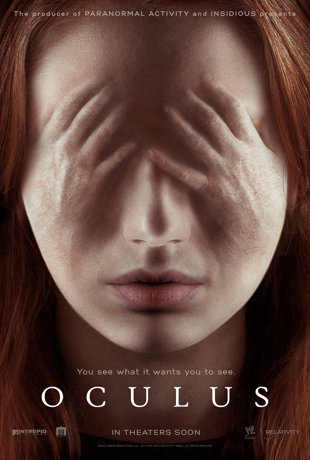 |
LYT: When you got to live out the fanboy dream by casting two stars of your favorite sci-fi shows, how was that dream to live out, and did anyone at any point say they’re not big enough, you can’t do it?
MF: There’s always that. People say that from the beginning. We had really supportive producers with that who didn’t feel that way, who were like, it doesn’t matter if they’re perceived as big enough. I had a hard time overcoming the fan boy geek reaction early, for both of them. But once we kind of – once I got that out of my system, and we could get to work, it was really awesome. But yeah, from a fan’s point of view, it’s a dream come true!
One of the beauties of horror is that you don’t necessarily hang the movie on actors the way that you do in a big studio project, so being indie, it’s like nope, these are the right actors for the part, and they have a built-in audience. They have a built-in fan base, so that’s great, but we’re just going to stick with them and really believe that they’re the right people to play these parts. I’ve never once regretted that, and I’m grateful that the producers and the studio took the ride with us, all the same.
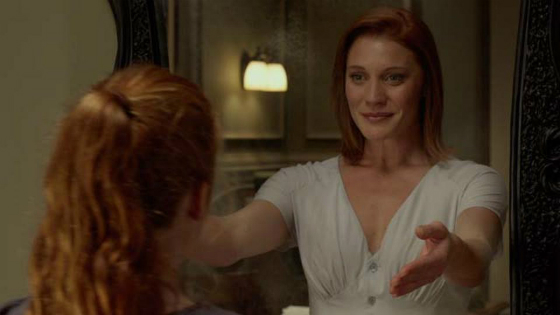 |
LYT: Now, on the flip side, in offering Karen the lead role in a big movie, are you the reason she quit Doctor Who?
MF: No! No, no, no, no! In fact, she had finished Doctor Who before she read our script. But as a fan, I would never have forgiven myself if that was the reason why. And it was really scary at the time, because she said, “Oh, no, I’m done with Doctor Who!” I was like, “What do you mean you’re done with Doctor Who?” She was like, “I can’t talk about that.” I was like, “What do you mean you’re done with Doctor Who? You mean you’re on hiatus, right? You’re going back, right?”
So it was that kind of thing, where I’m really grateful that she decided to leave Doctor Who when she did or we wouldn’t have gotten her, but as a fan I was sad, because I loved Amy Pond so much! But yeah, no – one had nothing to do with the other! It was really – I didn’t think we’d get her. It took so long to get a read from her, because she was filming her final episodes. I did have the really awesome fan boy experience of watching her final episode air while we were into production. We watched it together, so that was really kind of amazing. We hadn’t quite started shooting yet when the last episode of Doctor Who aired for her. Sitting in the room and watching it with her was really, really awesome for me as a fan!
LYT: Did you shoot all of this before she cut her hair?
MF: Yes. We shot this in October of 2012. Then we did additional photography in April of the following year. We were on the sound stage doing her ADR when she got the call that she had booked Guardians, and so I was there when they told her she would have to shave her head. Her reaction to that was really, really funny. But it was such a big opportunity. You’ve got to do that.
LYT: She seems like she’d be totally into that, honestly.
MF: She did, once she kind of decided to, you could tell she was enjoying it. I saw her in London a few months later when she had started production. She came out to a pub, and had been completely bald but didn’t bring her wig with her, and she said “This is really fascinating, because nobody recognizes me. Nobody approaches me. It’s kind of neat. I can just show up and be the strange bald chick at the bar!” She seemed to get a real kick out of it. I’m glad, though – I am glad we shot before that happened, because I think her hair is something of a really power trademark for her. But it was really funny when at Comic-Con she pulled off the wig and revealed that, it was really cool. I’m dying to see Guardians and to see what she does in that. It’s such a fascinating, different role for her.
LYT: Was she able to lose the accent just like that, or was there a lot of coaching involved?
MF: She did have a dialect coach, and that was a concern going in – how does she do 13 pages of monologue and maintain the American dialect? But she just did it. She prepared like crazy. Karen works very hard and spends an awful lot of time getting ready to shoot anything. She spent two or three months working on the dialect and working on memorization, so that by the time she showed up, she had done all of the heavy lifting, and that was a relief, because on our schedule, we really didn’t have time for anything else.
But yeah, she and Brenton [Thwaites] both had to bury competing accents. Brenton is Australian. It was really funny to watch them come in. I thought they both pulled off the dialect beautifully, and then we’d call “Cut,” and suddenly you’d have this very Scottish side of the set and very Australian side of the set, kind of dueling. It was really funny. I don’t know how they do it. I certainly couldn’t.
LYT: It is very good. I tend to be picky about that, because I have two parents with two different accents, and I grew up overseas.
MF: Where’d you grow up?
LYT: Ireland.
MF: Ah, Ireland!
LYT: Ewan McGregor’s American accent always bothers me, but Karen’s did not.
MF: Yeah, I thought she really pulled it off, and it ain’t easy!
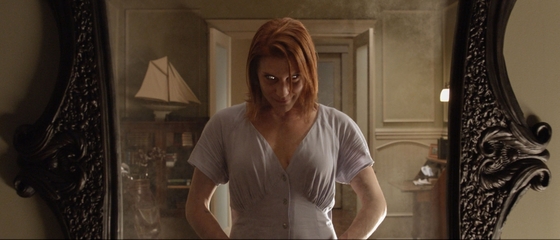 |
LYT: When you have a mirror that makes you see what it wants you to see, could a blind person just kick its ass really easily?
MF: That would be a fascinating idea! That would be a really interesting sequel idea. I imagine so! Well, if it can mess with perception, it can probably have a certain amount of defenses in place. I imagine they would have a leg up. What would you do to mess with them? That’s really funny. I like that.
LYT: They’d have to feel their way.
MF: That’s the way – they’d have to feel their way through the room, but it would be really difficult to trick them. That could be really funny.
LYT: One thing that I was thinking about was even though the mirror has this legacy of evil stuff, it’s basically the innocent victim in this movie. It’s just defending itself.
MF: Right, it’s just sitting there, and this potentially crazy woman comes and grabs it and points a gun at its head. I’ve always looked at it as kind of a force that lives and eats and, you know, she does make the point that it’s absolutely defending itself. I don’t know about ‘innocent victim,’ because there’s a malicious intent to it. It takes a little too much joy out of the pain it causes in people. But it certainly is fun – looking at the mirror as a character is certainly fun.
LYT: But all the pain it causes is before the timeline of the movie. In the movie itself, everything it does is in self-defense.
MF: We would joke – there’s a scene where she pulls of the sheet and she says, “Hello again, how are you?” There were a few times where we were shooting it where we would be hanging out behind it during rehearsals, and she’d say, “Hello again” and we’d say, “Hello, how are you?” “I’ve been fine, thanks.” “Sorry about your parents. This is awkward.”
We tried to give that mirror a voice, because it’s ripe for comedy, especially on the set. A mirror as a movie monster is an inherently ridiculous idea, so that was something we embraced in production, but we really had to try to find ways to make it scary, because it was like, it’s a mirror – how is this going to work?
LYT: Have you worked out a backstory for why it is the way it is, that maybe would be used in sequels, if there are any?
MF: I have worked out a backstory. I don’t know that I would want to include it in the sequel, because one of the things that I believe is that when you deal with evil in fiction, when you give it a back story, it takes away a lot of the mystique. There is no story that I could come up with that would be satisfying to everybody. And I think leaving the mystery, on the other hand, is better.
So we’ve been very resistant to having to explain why the mirror is the way it is, because people throw out ideas like, “Oh, forged by Satanists.” It just never seems good enough. Why does Freddy Krueger get to go into people’s dreams and kill them? We never know. We know how he died, but we don’t know why he’s special enough to take this supernatural revenge. It’s better that we don’t know, because any story we come up with is kind of lame.
LYT: But they did in Freddy’s Dead, the dream demons – remember?
MF: The dream demons. In Freddy’s Dead, or in New Nightmare?
LYT: In Freddy’s Dead, the dream demons escape his body when he dies, and it was not satisfying.
MF: You’re right. And even that does not give you – why did they pick him? How did they inhabit? Where did THEY come from? Any explanation is never going to be good.
—
Oculus opens Friday in theaters.

